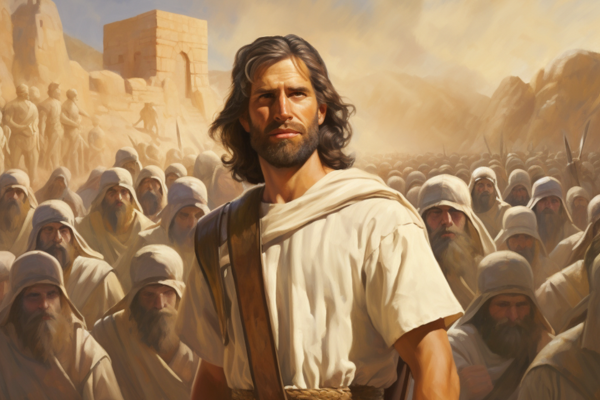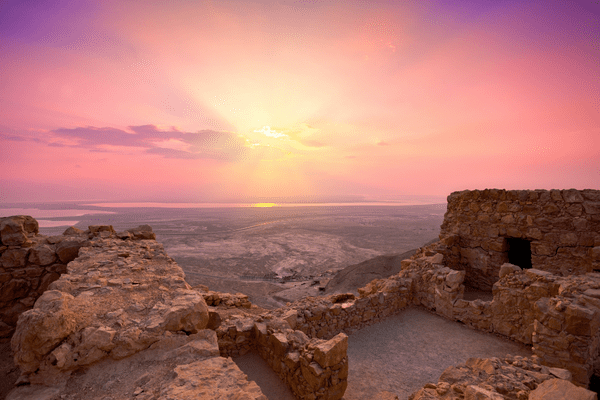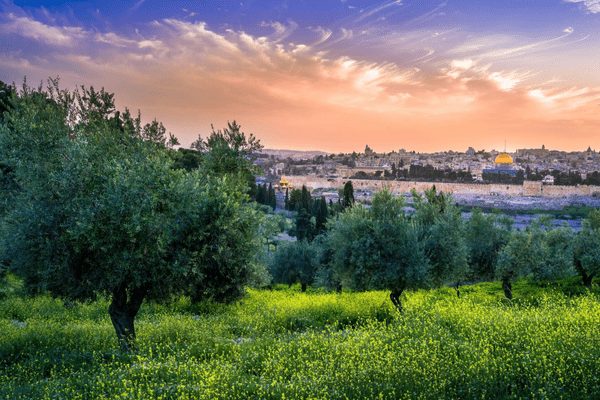
TORAH
NEVI'IM
KETUVIM
Chapter 13
Translation and Transliteration of
Listen to this chapter in Hebrew:
- Commentary
- Buy E-book
- Buy the Israel Bible
1Yehoshua was now old, advanced in years. Hashem said to him, “You have grown old, you are advanced in years; and very much of the land still remains to be taken possession of.
אוִיהוֹשֻׁעַ זָקֵן בָּא בַּיָּמִים וַיֹּאמֶר יְהֹוָה אֵלָיו אַתָּה זָקַנְתָּה בָּאתָ בַיָּמִים וְהָאָרֶץ נִשְׁאֲרָה הַרְבֵּה־מְאֹד לְרִשְׁתָּהּ׃
2This is the territory that remains: all the districts of the Philistines and all [those of] the Geshurites,
בזֹאת הָאָרֶץ הַנִּשְׁאָרֶת כָּל־גְּלִילוֹת הַפְּלִשְׁתִּים וְכָל־הַגְּשׁוּרִי׃
3from the Shihor, which is close to Egypt, to the territory of Ekron on the north, are accounted Canaanite, namely, those of the five lords of the Philistines—the Gazites, the Ashdodites, the Ashkelonites, the Gittites, and the Ekronites—and those of the Avvim
גמִן־הַשִּׁיחוֹר אֲשֶׁר עַל־פְּנֵי מִצְרַיִם וְעַד גְּבוּל עֶקְרוֹן צָפוֹנָה לַכְּנַעֲנִי תֵּחָשֵׁב חֲמֵשֶׁת סַרְנֵי פְלִשְׁתִּים הָעַזָּתִי וְהָאַשְׁדּוֹדִי הָאֶשְׁקְלוֹנִי הַגִּתִּי וְהָעֶקְרוֹנִי וְהָעַוִּים׃
4on the sout; further, all the Canaanite country from Mearah of the Sidonians to Aphek at the Amorite border
דמִתֵּימָן כָּל־אֶרֶץ הַכְּנַעֲנִי וּמְעָרָה אֲשֶׁר לַצִּידֹנִים עַד־אֲפֵקָה עַד גְּבוּל הָאֱמֹרִי׃
5and the land of the Gebalites, with the whole [Valley of the] Lebanon, from Baal-gad at the foot of Mount Chermon to Lebo-hamath on the east,
הוְהָאָרֶץ הַגִּבְלִי וְכָל־הַלְּבָנוֹן מִזְרַח הַשֶּׁמֶשׁ מִבַּעַל גָּד תַּחַת הַר־חֶרְמוֹן עַד לְבוֹא חֲמָת׃
6with all the inhabitants of the hill country from the [Valley of the] Lebanon to Misrephoth-maim, namely, all the Sidonians. I Myself will dispossess those nations for the Israelites; you have only to apportion their lands by lot among Yisrael, as I have commanded you.
וכָּל־יֹשְׁבֵי הָהָר מִן־הַלְּבָנוֹן עַד־מִשְׂרְפֹת מַיִם כָּל־צִידֹנִים אָנֹכִי אוֹרִישֵׁם מִפְּנֵי בְּנֵי יִשְׂרָאֵל רַק הַפִּלֶהָ לְיִשְׂרָאֵל בְּנַחֲלָה כַּאֲשֶׁר צִוִּיתִיךָ׃
7Therefore, divide this territory into hereditary portions for the nine tribes and the half-tribe of Menashe.”
זוְעַתָּה חַלֵּק אֶת־הָאָרֶץ הַזֹּאת בְּנַחֲלָה לְתִשְׁעַת הַשְּׁבָטִים וַחֲצִי הַשֵּׁבֶט הַמְנַשֶּׁה׃
8Now the Reubenites and the Gadites, along with the other half-tribe, had already received the shares which Moshe assigned to them on the east side of the Yarden—as assigned to them by Moshe the servant of Hashem:
חעִמּוֹ הָראוּבֵנִי וְהַגָּדִי לָקְחוּ נַחֲלָתָם אֲשֶׁר נָתַן לָהֶם מֹשֶׁה בְּעֵבֶר הַיַּרְדֵּן מִזְרָחָה כַּאֲשֶׁר נָתַן לָהֶם מֹשֶׁה עֶבֶד יְהֹוָה׃
9from Aroer on the edge of the Wadi Arnon and the town in the middle of the wadi, the entire Tableland [from] Medeba to Dibon,
טמֵעֲרוֹעֵר אֲשֶׁר עַל־שְׂפַת־נַחַל אַרְנוֹן וְהָעִיר אֲשֶׁר בְּתוֹךְ־הַנַּחַל וְכָל־הַמִּישֹׁר מֵידְבָא עַד־דִּיבוֹן׃
10embracing all the towns of King Sihon of the Amorites, who had reigned in Heshbon, up to the border of the Ammonites;
יוְכֹל עָרֵי סִיחוֹן מֶלֶךְ הָאֱמֹרִי אֲשֶׁר מָלַךְ בְּחֶשְׁבּוֹן עַד־גְּבוּל בְּנֵי עַמּוֹן׃
11further, Gilad, the territories of the Geshurites and the Maacathites, and all of Mount Chermon, and the whole of Bashan up to Salcah
יאוְהַגִּלְעָד וּגְבוּל הַגְּשׁוּרִי וְהַמַּעֲכָתִי וְכֹל הַר חֶרְמוֹן וְכָל־הַבָּשָׁן עַד־סַלְכָה׃
12the entire kingdom of Og, who had reigned over Bashan at Ashtaroth and at Edrei. (He was the last of the remaining Rephaim.) These were defeated and dispossessed by Moshe;
יבכָּל־מַמְלְכוּת עוֹג בַּבָּשָׁן אֲשֶׁר־מָלַךְ בְּעַשְׁתָּרוֹת וּבְאֶדְרֶעִי הוּא נִשְׁאַר מִיֶּתֶר הָרְפָאִים וַיַּכֵּם מֹשֶׁה וַיֹּרִשֵׁם׃
13but the Israelites failed to dispossess the Geshurites and the Maacathites, and Geshur and Maacath remain among Yisrael to this day.
יגוְלֹא הוֹרִישׁוּ בְּנֵי יִשְׂרָאֵל אֶת־הַגְּשׁוּרִי וְאֶת־הַמַּעֲכָתִי וַיֵּשֶׁב גְּשׁוּר וּמַעֲכָת בְּקֶרֶב יִשְׂרָאֵל עַד הַיּוֹם הַזֶּה׃
14No hereditary portion, however, was assigned to the tribe of Levi, their portion being the fire offerings of Hashem, the God of Yisrael, as He spoke concerning them.
ידרַק לְשֵׁבֶט הַלֵּוִי לֹא נָתַן נַחֲלָה אִשֵּׁי יְהֹוָה אֱלֹהֵי יִשְׂרָאֵל הוּא נַחֲלָתוֹ כַּאֲשֶׁר דִּבֶּר־לוֹ׃
15And so Moshe assigned [the following] to the tribe of the Reubenites, for their various clans,
טווַיִּתֵּן מֹשֶׁה לְמַטֵּה בְנֵי־רְאוּבֵן לְמִשְׁפְּחֹתָם׃
16and it became theirs: The territory from Aroer, on the edge of the Wadi Arnon and the town in the middle of the wadi, up to Medeba—the entire Tableland
טזוַיְהִי לָהֶם הַגְּבוּל מֵעֲרוֹעֵר אֲשֶׁר עַל־שְׂפַת־נַחַל אַרְנוֹן וְהָעִיר אֲשֶׁר בְּתוֹךְ־הַנַּחַל וְכָל־הַמִּישֹׁר עַל־מֵידְבָא׃
17Heshbon and all its towns in the Tableland: Dibon, Bamoth-baal, Beth-baal-meon,
יזחֶשְׁבּוֹן וְכָל־עָרֶיהָ אֲשֶׁר בַּמִּישֹׁר דִּיבוֹן וּבָמוֹת בַּעַל וּבֵית בַּעַל מְעוֹן׃
18Jahaz, Kedemoth, Mephaath,
יחוְיַהְצָה וּקְדֵמֹת וּמֵפָעַת׃
19Kiriathaim, Sibmah, and Zereth-shahar in the hill of the valley,
יטוְקִרְיָתַיִם וְשִׂבְמָה וְצֶרֶת הַשַּׁחַר בְּהַר הָעֵמֶק׃
20Beth-peor, the slopes of Pisgah, and Beth-jeshimoth
כוּבֵית פְּעוֹר וְאַשְׁדּוֹת הַפִּסְגָּה וּבֵית הַיְשִׁמוֹת׃
21all the towns of the Tableland and the entire kingdom of Sihon, the king of the Amorites, who had reigned in Heshbon. (For Moshe defeated him and the Midianite chiefs Evi, Rekem, Zur, Hur, and Reba, who had dwelt in the land as princes of Sihon.
כאוְכֹל עָרֵי הַמִּישֹׁר וְכָל־מַמְלְכוּת סִיחוֹן מֶלֶךְ הָאֱמֹרִי אֲשֶׁר מָלַךְ בְּחֶשְׁבּוֹן אֲשֶׁר הִכָּה מֹשֶׁה אֹתוֹ וְאֶת־נְשִׂיאֵי מִדְיָן אֶת־אֱוִי וְאֶת־רֶקֶם וְאֶת־צוּר וְאֶת־חוּר וְאֶת־רֶבַע נְסִיכֵי סִיחוֹן יֹשְׁבֵי הָאָרֶץ׃
22Together with the others that they slew, the Israelites put Balaam son of Beor, the augur, to the sword.)
כבוְאֶת־בִּלְעָם בֶּן־בְּעוֹר הַקּוֹסֵם הָרְגוּ בְנֵי־יִשְׂרָאֵל בַּחֶרֶב אֶל־חַלְלֵיהֶם׃
23The boundary of the Reubenites was the edge of the Yarden. That was the portion of the Reubenites for their various clans—those towns with their villages.
כגוַיְהִי גְּבוּל בְּנֵי רְאוּבֵן הַיַּרְדֵּן וּגְבוּל זֹאת נַחֲלַת בְּנֵי־רְאוּבֵן לְמִשְׁפְּחֹתָם הֶעָרִים וְחַצְרֵיהֶן׃
24To the tribe of Gad, for the various Gadite clans, Moshe assigned [the following],
כדוַיִּתֵּן מֹשֶׁה לְמַטֵּה־גָד לִבְנֵי־גָד לְמִשְׁפְּחֹתָם׃
25and it became their territory: Jazer, all the towns of Gilad, part of the country of the Ammonites up to Aroer, which is close to Rabbah,
כהוַיְהִי לָהֶם הַגְּבוּל יַעְזֵר וְכָל־עָרֵי הַגִּלְעָד וַחֲצִי אֶרֶץ בְּנֵי עַמּוֹן עַד־עֲרוֹעֵר אֲשֶׁר עַל־פְּנֵי רַבָּה׃
26and from Heshbon to Ramath-mizpeh and Betonim, and from Mahanaim to the border of Lidbir;
כווּמֵחֶשְׁבּוֹן עַד־רָמַת הַמִּצְפֶּה וּבְטֹנִים וּמִמַּחֲנַיִם עַד־גְּבוּל לִדְבִר׃
27and in the Valley, Beth-haram, Beth-nimrah, Succoth, and Zaphon—the rest of the kingdom of Sihon, the king of Heshbon—down to the edge of the Yarden and up to the tip of the Sea of Chinnereth on the east side of the Yarden.
כזוּבָעֵמֶק בֵּית הָרָם וּבֵית נִמְרָה וְסֻכּוֹת וְצָפוֹן יֶתֶר מַמְלְכוּת סִיחוֹן מֶלֶךְ חֶשְׁבּוֹן הַיַּרְדֵּן וּגְבֻל עַד־קְצֵה יָם־כִּנֶּרֶת עֵבֶר הַיַּרְדֵּן מִזְרָחָה׃
28That was the portion of the Gadites, for their various clans—those towns with their villages.
כחזֹאת נַחֲלַת בְּנֵי־גָד לְמִשְׁפְּחֹתָם הֶעָרִים וְחַצְרֵיהֶם׃
29And to the half-tribe of Menashe Moshe assigned [the following], so that it went to the half-tribe of Menashe, for its various clans,
כטוַיִּתֵּן מֹשֶׁה לַחֲצִי שֵׁבֶט מְנַשֶּׁה וַיְהִי לַחֲצִי מַטֵּה בְנֵי־מְנַשֶּׁה לְמִשְׁפְּחוֹתָם׃
30and became their territory: Mahanaim, all of Bashan, the entire kingdom of Og, king of Bashan, and all of Havvoth-jair in Bashan, sixty towns;
לוַיְהִי גְבוּלָם מִמַּחֲנַיִם כָּל־הַבָּשָׁן כָּל־מַמְלְכוּת עוֹג מֶלֶךְ־הַבָּשָׁן וְכָל־חַוּׂת יָאִיר אֲשֶׁר בַּבָּשָׁן שִׁשִּׁים עִיר׃
31and part of Gilad, and Ashtaroth and Edrei, the royal cities of Og in Bashan, were assigned to the descendants of Machir son of Menashe—to a part of the descendants of Machir—for their various clans.
לאוַחֲצִי הַגִּלְעָד וְעַשְׁתָּרוֹת וְאֶדְרֶעִי עָרֵי מַמְלְכוּת עוֹג בַּבָּשָׁן לִבְנֵי מָכִיר בֶּן־מְנַשֶּׁה לַחֲצִי בְנֵי־מָכִיר לְמִשְׁפְּחוֹתָם׃
32Those, then, were the portions that Moshe assigned in the steppes of Moab, on the east side of the Yarden.
לבאֵלֶּה אֲשֶׁר־נִחַל מֹשֶׁה בְּעַרְבוֹת מוֹאָב מֵעֵבֶר לְיַרְדֵּן יְרִיחוֹ מִזְרָחָה׃
33But no portion was assigned by Moshe to the tribe of Levi; Hashem, the God of Yisrael, is their portion, as He spoke concerning them.
ul-SHAY-vet ha-lay-VEE lo na-TAN mo-SHEH na-kha-LAH a-do-NAI e-lo-HAY yis-ra-AYL HU na-kha-la-TAM ka-a-SHER di-BER la-HEM
לגוּלְשֵׁבֶט הַלֵּוִי לֹא־נָתַן מֹשֶׁה נַחֲלָה יְהֹוָה אֱלֹהֵי יִשְׂרָאֵל הוּא נַחֲלָתָם כַּאֲשֶׁר דִּבֶּר לָהֶם׃
![]() 13:33 But no portion was assigned by Moshe to the tribe of Levi
13:33 But no portion was assigned by Moshe to the tribe of Levi
The tribe of Levi is the only one who was not assigned a portion of land. Instead of land, Hashem is to be their inheritance: The Kohanim (Priests) and the Leviim (Levites) are to perform the special task of serving in the Holy Temple and teaching Hashem’s Torah to the people. In return, the people, as a whole, are obligated to support them financially, by giving them special gifts from produce grown in Eretz Yisrael, as commanded in the Torah. In the case of the Kohanim, they are also to receive portions of certain sacrifices. Although in our era these gifts are not given, Jews still separate a small amount of all produce grown in Israel. The continuation of this practice is a constant reminder of the sacred obligation to make sure that all members of society are provided with a sufficient livelihood.







